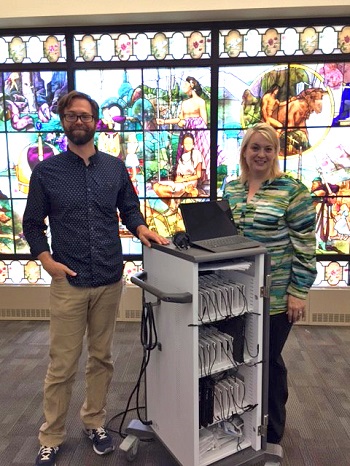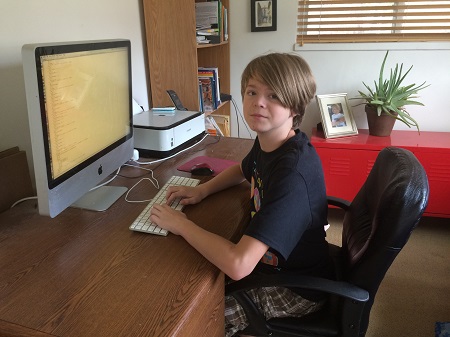By Michele Farrell
IMLS Senior Program Officer
The Orem Public Library in Orem, Utah has developed a “Techreation Center” that has proven wildly popular with the community’s youth. The center was developed after the library received $27,662 as a subrecipient of Utah State Library’s Grants to States grant. I recently visited the library and asked project director Nathan Robison to share with UpNext readers how the center came to be.
Why apply for a grant? While he and his wife have backgrounds in the humanities, their then nine-year-old son Christopher was interested in STEM (Science, Technology, Engineering And Math). They looked around the community, but couldn’t find any place for their son to go. Around the same time a local software company approached the library looking for space to do programming. As a result, Nathan, who has been working at the library for nearly six years, thought the library would be the perfect fit. When they first started offering classes, kids brought their own computers. However, the kids that didn’t own computers showed up too. That’s when Nathan decided to write a grant.

Pictured are Nathan Robison, project director and Charlene Crozier, Library Director
What was the goal? The targeted audience was kids aged 6-12 and teens 13-17. He applied for the grant in spring 2015 and shortly afterward received funding. He purchased 30 Microsoft Surface Pros, 30 Minecraft licenses, and a charging cart to teach coding. Fortunately, there are several computer companies and universities in the area so he contacted them to find volunteers to teach basic coding. In the summer, approximately 50 kids met weekly from 2:00 to 3:00 p.m. In the fall, it was extended to two hours a session from 4:00 to 6:00 p.m. Minecraft software was used to teach the kids how to collaborate and problem solve. It allowed them to have access to educator-created games as well as the ability to create games. Older children learned HTML from computer science students. The center gives kids access to mentors as well as the chance to meet others their age who have similar interests.

Pictured: Project Director Nathan Robison’s son, Christopher was interested in STEM which sparked the idea for Techreation Center.
What lessons were learned? The goal may have been to teach coding skills, but in the process the kids learned other basic computers skills. They learned how to troubleshoot when tablets don’t connect to the Wi-Fi. They learned password management so they could remember their password from one week to the next. When the kids used an educator-created Minecraft mod called Volcano Town, there was pandemonium. The kids had to protect their town from an imminent volcanic eruption. It taught them to work together or they would lose the game. The librarians learned a few lessons too. Kids need clear instructions, ground rules, and an explanation of what to expect. Nathan advises librarians to find a balance between structured and informal learning. The kids are coming from school and many want to play. As a result, classes were lengthened to two hours: the first hour was structured learning while the second was self-directed. Still it doesn’t work to push the kids into coding. Some want to play games with others or make things. They liked using Twine to make text-based video games and stories. They also enjoyed making a Truth or Dare Game. Nathan was very pleased to see several kids with ASD (autism spectrum disorder) participate.
What improvements are planned? Nathan would like to refine their outreach effort. Last year he reached out to an elementary school only to find out that it had Wi-Fi limitations. This year he contacted the 4-H Club and they bought 3D printers for the space. I asked Nathan how he evaluates the center. He receives a weekly email from Prenda with tracking figures on how many kids logged in and what projects they looked at. He would like to do an informal survey of the kids to find out what they want to do with the computers. I suggested contacting the universities again to see if any education majors were interested in evaluating this project.
While it takes time to develop and sustain a project, Nathan plans to continue reaching out to the community engaging them in library programming. And Christopher? Well he’s now 12 and still coding.
Michele Farrell is a senior program officer within the Office of Library Services (OLS) at IMLS.